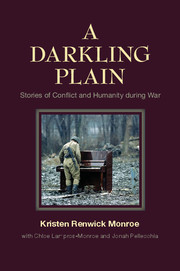Book contents
- Frontmatter
- Epigraph
- Contents
- Preface
- Introduction
- Part one War is a Terrible Thing!
- Part Two Guarding One’s Humanity During War: World War II
- Part Three Other Voices, Other Wars: From Indochina to Iraq
- Part Four Civil Wars and Genocides, Dictators and Domestic Oppressors
- Part Five My Story, Your Choice How to Use it
- Conclusion
- Bibliography
- Acknowledgments by the Senior Author
- Index
Conclusion
The enormity of it all
Published online by Cambridge University Press: 05 October 2014
- Frontmatter
- Epigraph
- Contents
- Preface
- Introduction
- Part one War is a Terrible Thing!
- Part Two Guarding One’s Humanity During War: World War II
- Part Three Other Voices, Other Wars: From Indochina to Iraq
- Part Four Civil Wars and Genocides, Dictators and Domestic Oppressors
- Part Five My Story, Your Choice How to Use it
- Conclusion
- Bibliography
- Acknowledgments by the Senior Author
- Index
Summary
War is a horrifying, brutal thing, so ferocious, dark, and foul it lies beyond words, perhaps beyond human comprehension. In the last century alone, war claimed more than 160 million lives and touched countless others. The statistics stagger and overpower, leaving us struggling to fathom the experiences of loved ones who were soldiers or civilians trapped in wars. How can we expect to help our children and students understand the reality of war, when we ourselves remain overwhelmed, simply by the numbers and the contemplation of war's devastation? Even those who live through war find it difficult to grasp fully what they endured and the extent of its effect on them.
As I write this, I think of my own father, a young man just out of law school and newly married when he enlisted in World War II. Daddy wore glasses so thick he was the last person you would want to turn loose in combat with a gun. The army had little idea what to do with lawyers anyway in those days, so my father was assigned desk jobs, spared the worst of the war. But he was kept on after the war to hear war crimes in the Far East. He lived through air raids in China and recorded legal testimony on both civilian and military atrocities. After being assigned as the American member of the British Commission of War Crimes in the Pacific, Daddy heard far too many stories of abuse in prisoner-of-war camps in Formosa, of American soldiers getting drunk and raping civilians, of random violence, and of bombs falling from the skies. My father died in 1973, when he was only 55, before he reached the age where people tend to step back and try to make sense of their lives and before I became interested in war as a topic of research. He never talked about the war with me or my brother. At the time, I did not think much of this silence. Kids can be remarkably cavalier and blasé about their parents’ lives, and I was certainly no different. But after speaking with so many others about their wartime experiences, I now wonder if this distancing signifies something deeper.
- Type
- Chapter
- Information
- A Darkling PlainStories of Conflict and Humanity during War, pp. 291 - 298Publisher: Cambridge University PressPrint publication year: 2014



